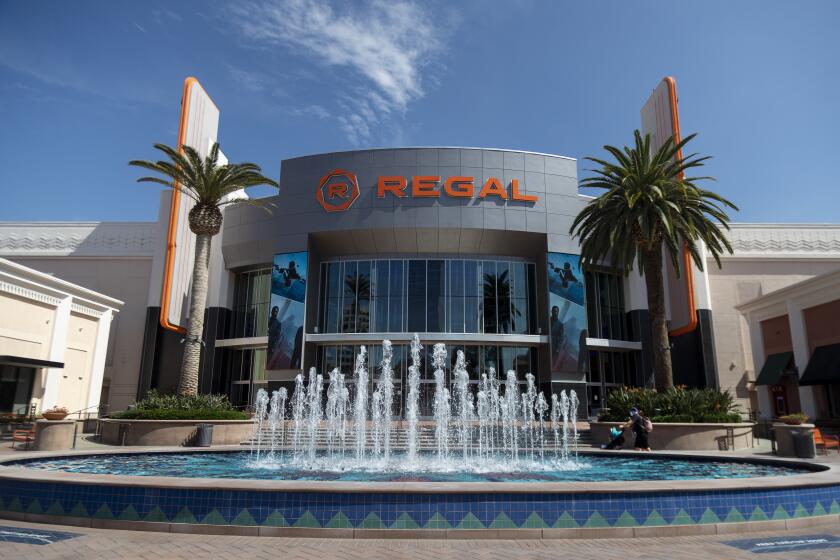AMC Theatres says it’s running out of cash as studios flee 2020
- Share via
The world’s largest movie theater chain says it could run out of cash by the end of this year or early 2021, the latest sign of how badly the COVID-19 pandemic has wrecked the film industry.
AMC Theatres has reopened more than 80% of its U.S. cinemas since the coronavirus crisis brought Hollywood to a standstill in March. But with no vaccine and few new movies to show, attendance has been abysmal and the chain is facing a cash crunch.
Leawood, Kan.-based AMC, which operates 598 locations in the U.S., said in a Tuesday regulatory filing that, since reopening, its cinemas have suffered an 85% decline in same-theater attendance compared with that period last year.
“At the existing cash burn rate, the company anticipates that existing cash resources would be largely depleted by the end of 2020 or early 2021,” AMC said in its filing. “Thereafter, to meet its obligations as they become due, the company will require additional sources of liquidity or increases in attendance levels.”
AMC’s stock fell 53 cents, or 13%, to $3.54.
Cinema stocks were hammered after Regal owner Cineworld said it would re-close its locations this week.
AMC had already taken several steps to survive months of closures during lockdowns. The heavily leveraged company restructured its debt to improve its balance sheet and negotiated with landlords to help reduce costs.
The company said it may have to take on additional debt to weather the ongoing downturn. AMC said it is also considering additional measures such as selling assets and continuing to negotiate with landlords on lease payments.
The situation for theaters worsened as Hollywood studios delayed big films or sent them to streaming services.
Highly anticipated movies including MGM and Universal’s James Bond film “No Time to Die,” Walt Disney Co.’s Marvel feature “Black Widow” and Warner Bros.’ sci-fi epic “Dune” shifted to 2021. Disney last week said its latest Pixar animated feature, “Soul,” would skip theaters entirely and debut on Disney+ in December.
Studios don’t want to release their potential blockbusters in theaters until cinemas are allowed to open in the nation’s biggest movie markets — New York and Los Angeles. The risk of distributing a $200-million tentpole is compounded by the fact that many moviegoers remain uncomfortable with the idea of returning to theaters without a coronavirus vaccine.
Officials in the state of New York and in Los Angeles County have given little to no indication of when movie houses will be able to open. AMC said 17% of its theaters remain closed, mostly in California, New York, North Carolina, Maryland and Washington, and that those locations represented 23% of its 2019 revenue.
Amid the uncertainty, rival Regal Cinemas decided it wasn’t worthwhile to stay open, opting to close most of its U.S. theaters last week.
AMC, however, said it would keep its theaters open. It cited its potentially groundbreaking deal with Universal Pictures for premium video on-demand releases as an advantage that would allow the Comcast-owned studio to continue releasing films in theaters.
Amid the pandemic, AMC and Universal signed a pact that would allow the studio to release its movies as $20 digital rentals 17 days after their theatrical debuts — a gap significantly shorter than the traditional 90-day window. AMC will get a share of the video on-demand revenue.
Observers may get a chance to see how the experiment plays out when Universal releases its DreamWorks Animation sequel “The Croods: A New Age” on Thanksgiving.
Credit ratings agency S&P Global early this month reduced its rating on AMC’s debt to “CCC-.”
More to Read
Inside the business of entertainment
The Wide Shot brings you news, analysis and insights on everything from streaming wars to production — and what it all means for the future.
You may occasionally receive promotional content from the Los Angeles Times.












